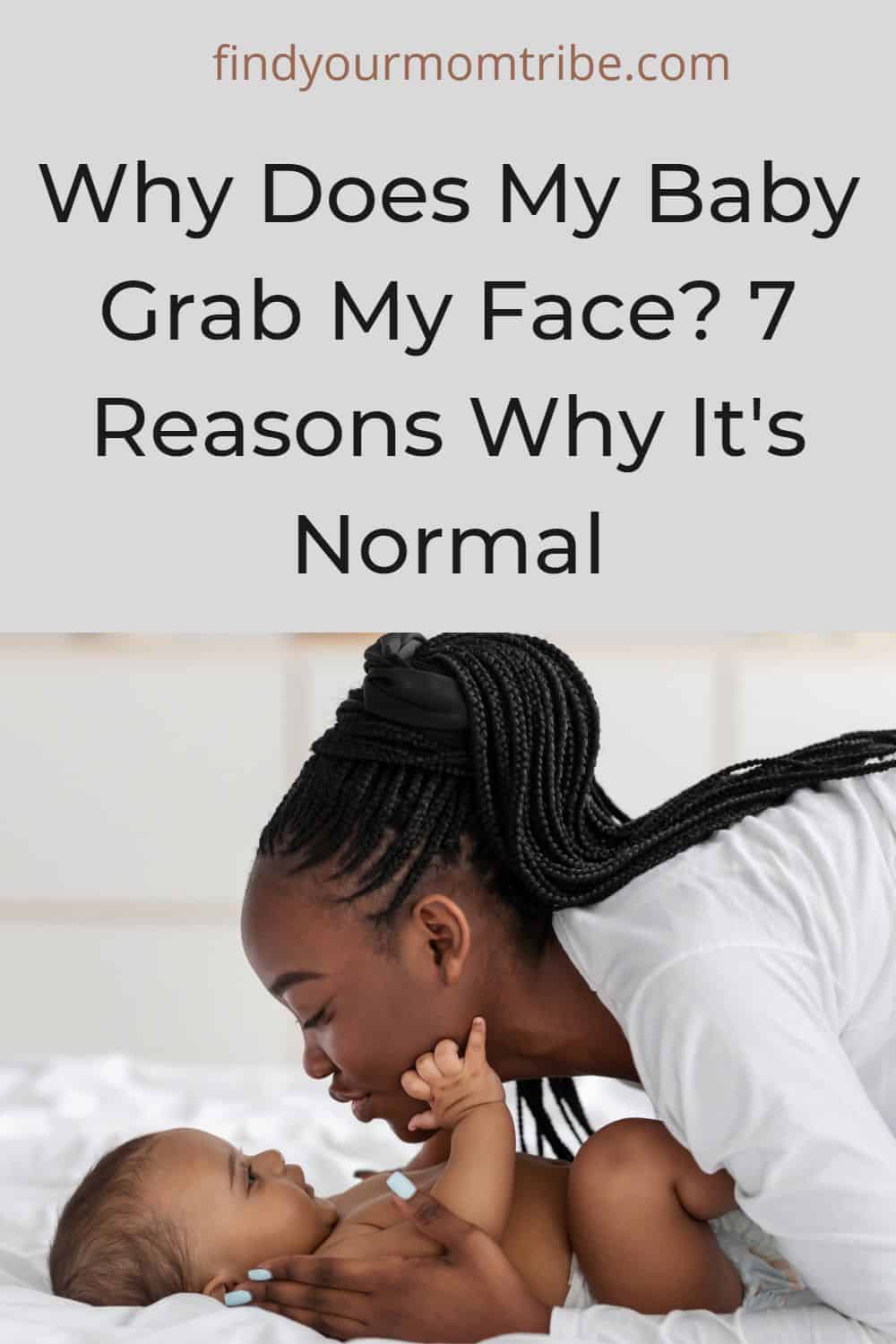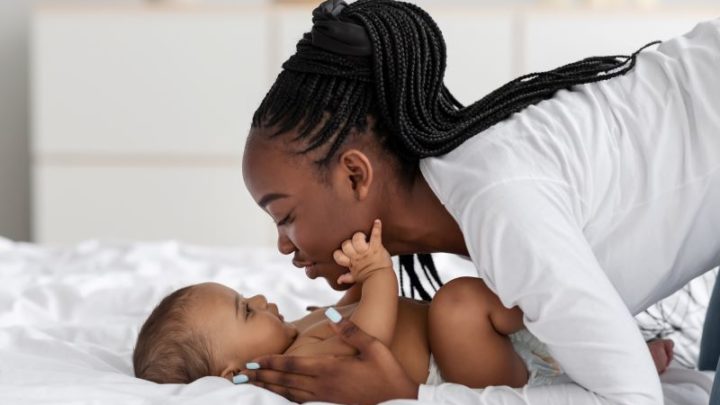Navigating the enigmatic world of newborn behaviors is a rite of passage for every parent, regardless of whether it’s their first or third time. One perplexing query that often arises is: Why does my baby grab my face? The answer to this seemingly simple question is multifaceted yet grounded in the basic principles of infant development.
When your little one reaches out to touch your face, they’re embarking on a tactile journey of exploration. Their burgeoning sense of touch drives them to explore the contours and textures of your skin, fostering a deeper connection with their primary caregivers. This tactile interaction, often accompanied by earnest eye contact, serves as a fundamental means for your baby to gather information about the world around them, with your face being a central point of focus.
However, the urge to grasp and explore extends beyond mere curiosity. It’s a crucial developmental milestone indicative of your baby’s growing awareness of their surroundings. As they become increasingly adept at manipulating their hands, they’ll eagerly utilize this newfound skill to engage with their environment. The act of reaching out and touching serves as a gateway to further exploration, laying the foundation for future cognitive and motor development.
7 Reasons Why a Baby Grabs Your Face
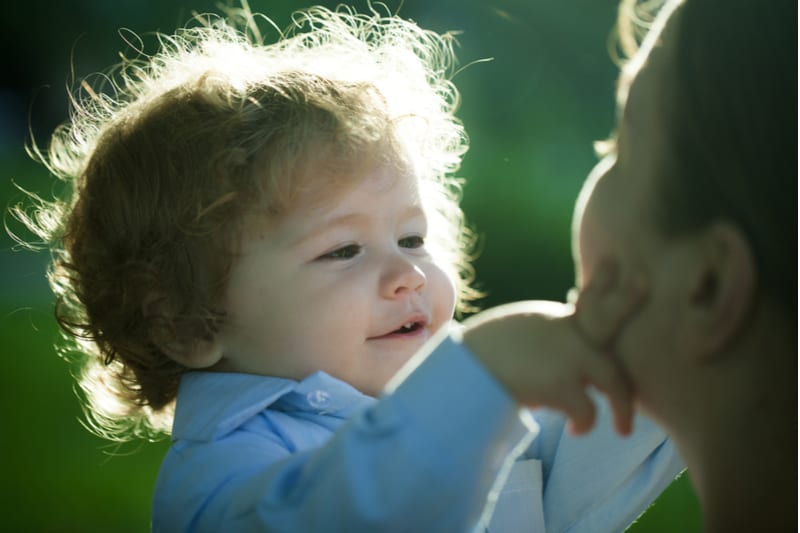
While the incessant grabbing may seem incessant at times, rest assured that it’s a perfectly normal aspect of your baby’s developmental journey. Embrace these moments of tactile exploration as opportunities for bonding and mutual discovery. In the following discourse, we’ll delve deeper into the various reasons behind your baby’s penchant for face-grabbing, shedding light on this fascinating aspect of infant behavior.
1. It’s a cry for attention
Unlike newborn babies, babies of approximately 8 months of age start using a new method of grabbing your attention that doesn’t just involve a good old-fashioned baby cry-session.
Your kiddo is going to try using his hands too.
Sometimes, you may even end up accidentally getting clawed by the baby’s nails, though don’t hold it against him as he’s not aware of his own strength.
Kids do this just so they can either get some of that greatly valued eye contact or to make sure they’re getting enough love.
Alternatively, it’s just to direct your focus to something specific that they may have done so they can earn some extra love from their mamma.
2. It’s all about exploration
When babies start exploring their sense of touch and start developing their fine and gross motor skills, it’s crucial to a baby’s development to explore all of these new sensations to facilitate a normal development cycle.
It’s one of the most active periods for kids as they finally start getting a more grounded version of object permanence and have a whole new avenue to explore.
This is why we buy them sensory toys when they reach the milestone of their first year of life, to help introduce our kids to new textures.
One such texture is your face, an unusual setup of various materials with different feels and densities that your little one’s hands will be all over, trying to get a grasp on what mommy looks and feels like.
He’s likely to do the same to any of your friends and loved ones who hold him so make sure to give them a bit of warning beforehand so as to not startle them.
3. An early expression of joy
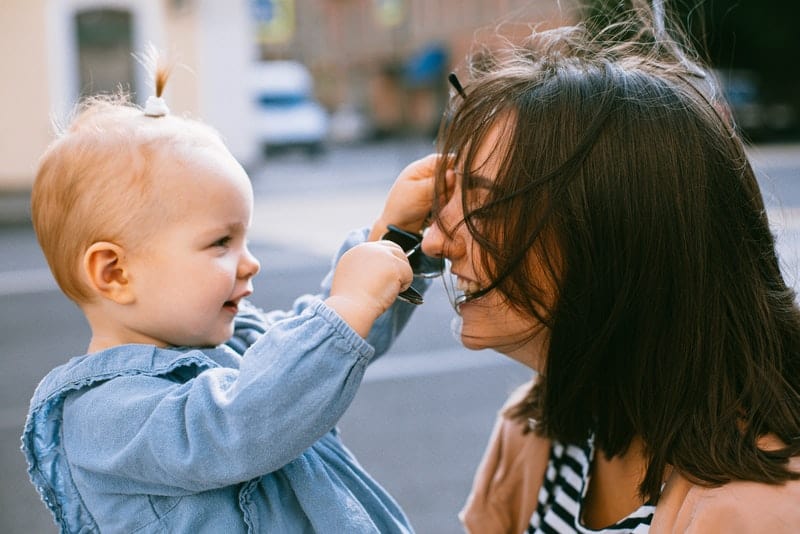
Playtime will occur differently at the various stages of development.
Before your child develops an imagination and starts putting it to good use, their play will be simple as they are limited by movement and cognitive abilities.
At a very young age, your baby may grab your face as an expression of joy or excitement. A change in your facial expressions or a sound you make may spark joy in them resulting in the face grab.
4. They want to grow closer to their mother
Arguably one of the cutest reasons is the fact that babies simply want to grow closer to mommy so they grab hold of your face to initiate eye contact and then smile warmly at you with the occasional cute baby giggle.
Make sure to respond in kind by cooing, babbling silly words, throwing a smile back, or just pulling him closer into your embrace. Your baby will appreciate it.
5. The driving force of fear
Before, the only way your baby could grab your attention when he was scared was through crying or producing other loud noises.
Now that he’s a bit more grown up, if something scares him, he’ll grab your face in a panic because he’s afraid and wants to go to his safe spot – you.
That’s something that’s ingrained in our chemistry as a natural instinct.
Younger kids run to their protector and caregiver for safety and the panic makes them grab your face.
It’s nothing new and you shouldn’t be alarmed, just reassure him that everything will be okay now that he’s with his parents and then let the baby sleep or get some cuddles.
6. Hunger strikes
A common grab for attention and answer to: Why does my baby grab my face? is to notify you that mealtime is near, especially in younger babies who are still on the breast milk diet.
If he grabs your face, there’s no need to wait to feed your baby.
This is usually around the time when babies start teething too, so be careful of any excess force during a breastfeeding session so you don’t get sore or cracked nipples.
7. Expressing their frustrations
Another answer to: Why does my baby grab my face? is that your baby may be upset about something you’ve done.
Normally this is a reaction to the baby’s crying not being met with a proper response so he just starts flailing about and grabbing what he can in a small tantrum, your face in this case.
Other times, it could also be because you’ve done something that he doesn’t like, maybe you won’t let him play with your hair or your necklace and now he’s upset.
Whatever the case may be, know that your baby can’t control these urges yet and it shouldn’t be taken up too harshly.
Why Do Babies Like to Grab?
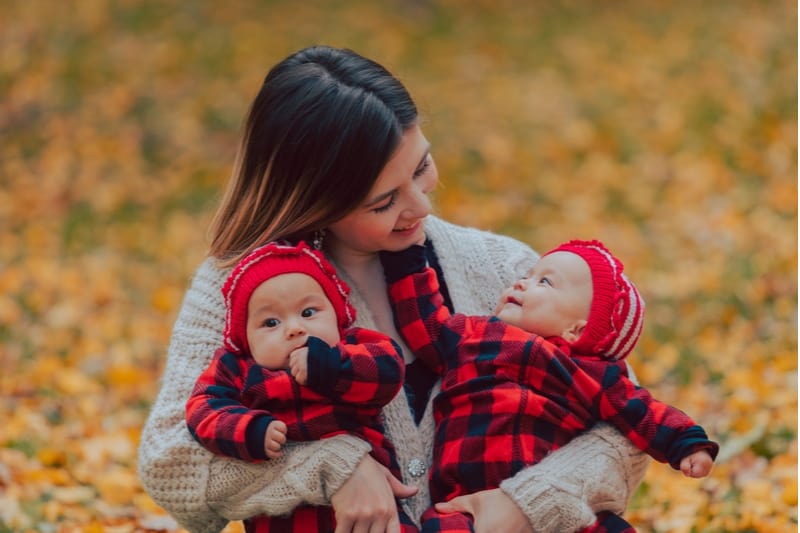
Babies have an innate tendency to grab onto objects as a means of exploration and seeking comfort. This behavior serves as a fundamental aspect of their sensory development, allowing them to familiarize themselves with their surroundings and establish a sense of security. When a baby reaches out to grab, whether it be a toy, object, or a parent’s face, it’s driven by a primal instinct to engage with their environment and connect with those closest to them.
The act of grabbing provides infants with a sense of control and agency over their immediate surroundings. It allows them to actively interact with the world, facilitating cognitive and motor skill development. Moreover, grasping objects enables babies to fulfill their innate curiosity, as they seek to understand the textures, shapes, and properties of the objects within their reach.
When a baby grabs onto a parent’s face, it’s often a gesture of seeking reassurance and connection. The familiar touch of a parent’s skin provides comfort and security, serving as a source of warmth and affection. Babies are instinctively drawn to the proximity of their caregivers, finding solace in their presence and touch. As they explore their parent’s face, they establish a bond rooted in trust and familiarity, laying the foundation for secure attachment and emotional development.
My baby grabbed my face while breastfeeding
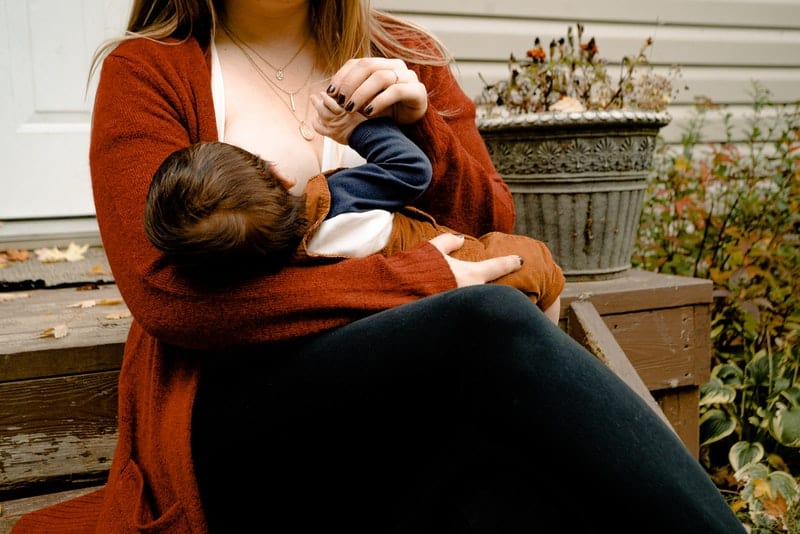
During breastfeeding, the act of face-grabbing may arise from the baby’s instinctual need for closeness and comfort. The physical contact with the mother’s face offers a sense of security and closeness, enhancing the bonding experience between parent and child. While occasional face-grabbing during breastfeeding is normal, it’s essential to ensure that it doesn’t interfere with the feeding process or cause discomfort for the parent.
As babies transition into toddlers, their grasp becomes more intentional and exploratory. Toddlers may engage in face-grabbing as a means of expressing excitement or curiosity, albeit with less finesse. While accidental scratches or pinches may occur during this phase, it’s crucial to respond with patience and understanding. Redirecting their attention to more appropriate forms of exploration and providing gentle guidance can help toddlers navigate this developmental stage with greater ease.
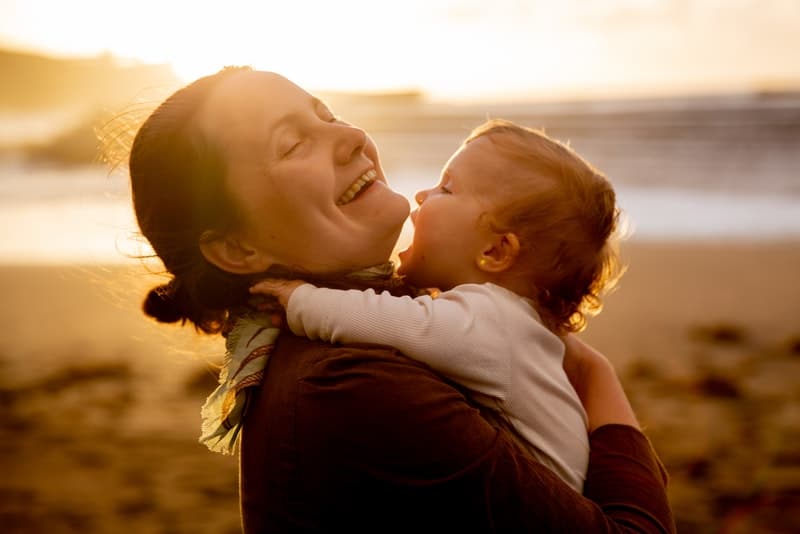
Your toddler may claw at your face out of excitement and curiosity stemming from their developing sense of touch. At this stage of development, toddlers are still learning about boundaries and may not fully comprehend the impact of their actions. While unintentional, these actions can result in minor scratches or discomfort for the parent.
It’s important not to interpret these behaviors as intentional acts of harm. Toddlers often explore the world around them through tactile experiences, which may include pulling hair, biting, pinching, or slapping. These actions are typically driven by a desire to understand and interact with their environment rather than a malicious intent to cause harm.
While it may be tempting to discourage these behaviors by keeping mittens on your toddler’s hands, this approach can hinder their sensory exploration and may lead to discomfort. Instead, it’s important to address these behaviors with patience and consistency.
Reacting strongly to your toddler’s actions may inadvertently reinforce the behavior by providing attention, whether positive or negative. Instead, try to remain calm and redirect their attention to more appropriate forms of exploration. By consistently reinforcing boundaries and providing gentle guidance, you can help your toddler learn appropriate ways to interact with others.
Did this happen to you?
As your baby explores their surroundings and learns to interact with the world, they may inadvertently cause scratches or discomfort with their newfound abilities. By remaining patient and offering gentle guidance, you can help them learn appropriate ways to express their curiosity and excitement.
Remember, every child is unique, and what works for one may not work for another. Trust your instincts as a parent and adapt your approach based on your child’s individual needs and temperament.
In the end, the bond between you and your baby will only grow stronger as you navigate these early stages together. So, embrace the journey, cherish the moments, and know that you’re doing an incredible job, mamma!
And don’t forget to tell us if your little one grabs you by the face.
Like this post? Please share or pin it for later. You can also stay in the loop and follow us on Facebook, Instagram or Pinterest.
